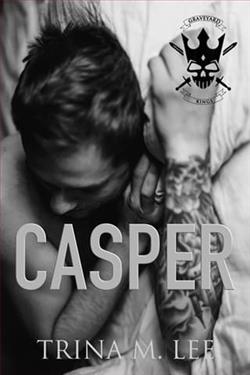Page 36 of The New Guy
Meanwhile, forty-six warriors wearing pads and blades on their feet fly by at high speed. Yeah, this isn’t intimidating at all.
But there’s no time for nerves. Before I’m ready, the audience rises for the national anthem. Soon, it’s game time. The ref drops the puck, Trevi snaps it to Drake, and off they go.
Watching from the bench is nothing like watching on TV—everything is louder and faster. I can hear every grunt, every chirp and every swish of steel against ice.
When people say that hockey is a physically brutal game, they’re not kidding. No wonder I’m so busy in the treatment room. The stress on players’ bodies is intense. Hockey requires rapid-fire lateral muscle movement, explosive acceleration and herculean core strength.
Our boys keep the battle mostly in our offensive zone for the first several shifts. As the minutes rack up, Brooklyn makes several attempts on goal. But Florida’s keeper is having a good night, and we can’t seem to put anything in the basket.
My job is to watch the hits closely. If anyone gets injured, it will help me to see the play unfold. Like when Trevi gets smushed against the boards by a monster of a defenseman, and gives his shoulders a couple of awkward shrugs after the hit.
Hell.
As he returns to the bench, I sidle up behind him. “Bad hit? Any damage?”
After a squirt of water from one of the bottles, he retracts his shoulder blades, as if testing them out. “No real damage. Just feels like my spine is a little out of whack.”
“Lift your elbows a couple inches.” When he does, I bend over and grasp him under the arms in an awkward hug from behind. “Deep breath in. Then out.” When he exhales, I lift him up off the bench. His spine makes a series of pops as it releases in several places.
“Whoa. Cool. Thanks.”
“Dude,” says Hudson, who’s sitting beside him. “Trevi’s an inch taller after that.” Then he rises suddenly and vaults over the boards for his shift.
I watch him go, and it’s an awesome sight. Powerful muscles send him flying forward, like a Porsche accelerating on the autobahn. Then he spins effortlessly around to skate backward at high speed in his opponent’s face.
Watching the spectacle from point-blank range, I feel like I’m seeing him for the first time. He’s a fierce mix of raw power and beauty. As if I’m watching him do what he was put on this earth to do.
I’m so impressed.
All our boys skate hard, but the first period ends scoreless. We troop back to the locker room, where I spend a sweaty fifteen minutes stretching muscles and re-taping wrists. I check the app on my phone for a look at Drake’s blood sugar, which looks good.
Then it’s back out there for another bruising period. At the six-minute mark, Castro gets a goal, and we all celebrate. On the next play, though, a Florida player catches Newgate in the chin with the blade of his stick.
“Foul! High sticking!” I yell, as if the ref were looking for my opinion.
Luckily, I’m not the only one who saw it. The whistle blows. I see Newgate raise a hand to his face, and come away with blood.
Something twists inside me at the sight of it. I’m not squeamish, but I don’t like to see someone I admire bleeding.
The whole bench cheers, though. And I remember that the penalty for drawing blood is a four minute bench minor, instead of two.
Newgate is smiling when he skates back to the bench for the power play. But I pull an antiseptic wipe out of my bag and lean over him to blot away the blood.
He grabs the wipe out of my hands and presses it to his skin himself. “I got it,” he snaps.
I take a quick step back.
Henry warned me about this, actually. Some players don’t want you to touch them during a game unless it’s absolutely necessary, while others don’t mind. He’d said, “It comes down to preference, and how they manage their focus during games.”
So I’m not offended, although I would have liked to get a better look at the cut. I guess it can wait until the next intermission.
Florida scores, unfortunately. Then each team scores again, giving us a tie game as the second buzzer sounds.
I’m running on fumes during the second intermission, taping limbs and dabbing at cuts and stretching out O’Doul’s shoulder.
When the third period begins, I’m rolling my own neck, trying to release the tension from my shoulders. The speed of the game picks up, and I barely breathe for twenty straight minutes. As the clock is ticking down, my eyes lock on Newgate. He’s skating with fire and aggression, while sweat pours down his face.
Success in sports is often more about desire than talent. And Hudson wants this win badly. Even seated on the bench between shifts, his focus is locked onto the contest.















